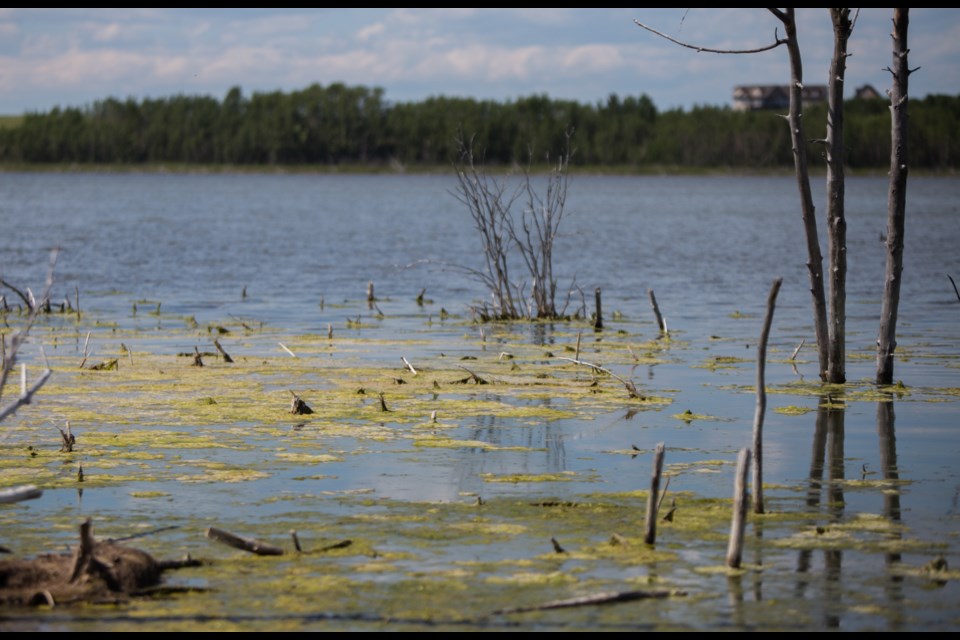As a result of a recent blue-green algae bloom, a health advisory has been issued for Cochrane Lake.
Alberta Health Services (AHS) issued the advisory on June 22, stating the recent discovery of cyanobacteria in the lake means residents living near the shores, as well as visitors, should take various precautions.
According to AHS, lake users are advised to avoid all physical contact with blue-green algae blooms, and to wash with tap water immediately if contact does occur. AHS is also stressing that people should not swim, wade or allow their pets to swim in any areas of the lake where blue-green algae is visible.
Fish from the lake should also not be consumed by either humans or pets, the advisory added.
“As always, visitors and residents are reminded to never drink or cook with untreated water directly from any recreational body of water, including Cochrane Lake, at any time,” the advisory stated. “Boiling of this water will not remove the toxins produced by blue-green algae. An alternate source of drinking water should also be provided for pets and livestock while this advisory is active.”
Dr. Christine Kennedy, an AHS medical officer of health for the Calgary Zone, said blue-green algae blooms are a naturally occurring cyanobacteria comprised of several million micro-organisms. The arrival and growth of this algae in Cochrane Lake is the result of recent environmental conditions.
“It’s been quite warm on and off lately,” Kennedy said. “Warm weather coupled with low wind can certainly favour the growth of this [algae].”
Kennedy said the last time a blue-green algae bloom advisory was issued for Cochrane Lake was in August 2013. She said the current advisory will likely remain in effect throughout the summer and fall, as blue-green algae blooms do not typically dissipate until temperatures have cooled.
“In Alberta, what we’ve found is that once a blue-green algae water advisory has been placed on a bottom of water, those conditions generally stay in place until late fall die-off occurs,” she said. “Usually, we see the advisory lifted in mid-to-late November. We would expect this particular advisory to stay in place until the late fall.”
While that will be disappointing news to users of Cochrane Lake, Kennedy said it is important to abide by AHS's advisory, as contact with the algae blooms can be detrimental to people’s health. Specifically, contact may result in skin irritation, a sore throat, sore eyes, swollen lips, a fever, nausea and vomiting or diarrhea.
Symptoms usually appear within one to three hours and resolve in one to two days, the advisory stated, and symptoms in children are often more pronounced than adults.
“We advise to avoid all contact with the blue-green algae blooms, and that includes the water that algae is located in,” Kennedy said. “The problem is, when these algae blooms occur, when they die off, they release a certain toxin into the water. That toxin can act as an irritant, as well as a poison, for humans and livestock.”
Though boating and kayaking will still be allowed on Cochrane Lake this summer, Kennedy said boaters should avoid the areas where the algae is visible, as it is thick and can “gum up the motors.” She added the algae is easy to spot, as it tends to sit on top of the water like a fuzzy green mat, and is usually located in the areas of the lake that are downwind.
According to Kennedy, there are steps people can take to reduce the chance of blue-green algae blooms developing in the future. While little can be done about temperatures and wind conditions, she said people should try to limit the amount of sewage and fertilizer that make their way into the water.
“By limiting the use of fertilizer around the lake and using pump-out tanks instead of septic fields to dispose of wastewater, that can really go a long way to help prevent these blooms,” she said.
AHS states that anyone who suspects a problem related to blue-green algae or who requires further information on health concerns should call Health Link at 811. Additional information is also available online, at bit.ly/3qmTN2Z
Scott Strasser, AirdrieToday.com
Follow me on Twitter @scottstrasser19



